Natural Medicine Interview Sessions: Talking Vipassana with @porters
Some of you might have met @porters before - she's a passionate member of @earthtribe, @naturalmedicine and @ecotrain, and lives in the forest in Saskatchewan. She's an avid gardener and a nature lover, and is a beautiful human being all around. We got talking because we'd both experienced vipassana meditation.
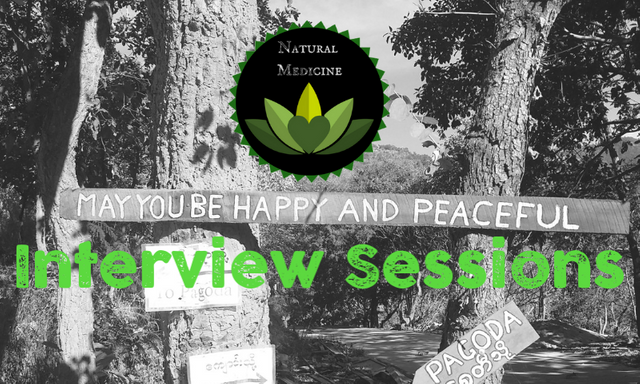
RF: You first came upon Buddhist thought with a book you found at a garage sale, is that right? How long was it between then and sitting your first vippassana course, and how did you hear about that particular practice?
Porters: Yes it was a book of Buddhist writings that first tweaked my interest in Buddhism, and got me borrowing all sorts of books from the library trying to find out more. Then in came my future husband who had a whole library of Dhamma books which he shared with me. Oh! The level of conversations we would have discussing the Dhamma! You see my husband had been a Vippassana teacher at the International Meditation Center UK. He had really developed his meditation and I feel blessed to have made the connection with him! I too had done some meditation with the Divine Light group but it did not have the depth nor had I gained any further insights from it as I do with Vippassana meditation.
RF: That's amazing! I wonder if it was the interest in Dhamma that drew you both together somehow - I have a friend that would say that would be undoubtedly why you got together! My best mate met her husband on a course in New Zealand! They are senior teachers now and go from course to course in Australia and New Zealand. I think having a partner to practice makes all the difference.
So how long was it before you sat your first course?
Porters: It was probably a few years before I actually sat a formal course but I was growing in the Dhamma. Finally my now husband encouraged me to go take a course at the meditation center in the States (he didn't want to teach me because we were now husband and wife and he figured I'd benefit more by going to the meditation center) which I found wonderful! Such good people and there was so much love. There it truly put me on the path and I keep up my Vippasana meditation practise, receiving immense benefits.
RF: Sounds like an amazing place. It's fantastic you keep it up - I need to go and sit another course soon to get me focussed again, but I try my best! Most people realise what you're talking about when they say the 'ten day silent retreat' (thought they can go for 60 days or longer!). Can you tell us a bit about your first course? How did you find the experience?
Porters: Actually we do not live close to a center, I had to travel over a thousand miles to take that course, but it was well worth it! I was a bit nervous attending my first course for I knew it was with friends of my husband, fellow teachers, who would be directing the course and my husband was held in such high standing in the community that I wanted to keep that respect as his wife. My husband had trained in the Sayagyi U Ba Khin tradition under one of his senior disciples, Mya Thwin, known as Mother Sayamagyi. She was very firm with her students, wanting them to realize what an opportunity it is to come in contact with the Dhamma, how precious it is and that they should put in maximum effort to realize the truth of the Dhamma and work towards that ultimate goal of Nibbanic Peace within.

You can read more about Sayagyi U Ba Khin here
RF: It's pretty amazing to train under someone so esteemed in the tradition! I'm familiar with the U Ba Khin tradition, as that's also the one my friend is familiar with, and she spend much time in Burma. Sayagyi U Ba Kin visited Webu Sayadaw's monastry in northern Burma (I'm explaining this to our readers now) who was so impressed with his vipassana practice he insisted he go and teach Dhamma. Sayagyi taught Goenke, who brought the teachings to the West. Quite the lineage! So was your husband equally firm with you?
Porters: He passed on to me that need to strive and try to get maximum benefit from sitting the course and that I did.
RF: Yes, that's the message when you enter, isn't it? It's kinda pointless if you don't. It's hard, but you may as well make the most of it - I can't understand those who sneak off for pizza mid course! Those early mornings though, huh?
Porters: Yes, on the course I was up at 4 am. to catch the early morning sitting (working on meditation), I was sitting 6 hours a day and we would have evening discourses with one more hour of sitting before bed, so 7 hours a day. We were lead in the morning meditations and the teacher did a check in the afternoon sessions to see how you were progressing and answer any questions we had. I had a lot of stuff to clear out but I did have some very beautiful experiences and one of the most beautiful experience I had was at the end of the course when the teacher would give his blessing and he would just radiate Metta! That is what I aspired to. To be able to radiate that Metta - loving kindness! I was quite blissed out by end of the course but the travels home, with some of the problems I encounter, diminished it somewhat. Once home I was eager to share with my husband and we were able to now sit together, being we were both now practicing Vippassana meditation. We would do self-courses at home and eventually we built a meditation studio, separate from the house, so we were removed from the distractions of the household.
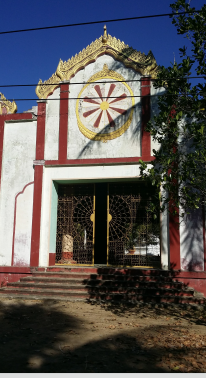
Beautiful dhamma hall at Ingyinbin monastery, Burma
RF: Oh, so nice to have a meditation space JUST for that purpose. It helps you focus. As for my first course, I remember a lot of pain in my body from long hours of sitting! It was hard to get comfortable. I am much better at it now! I remember being given the insight or vippassana and feeling this incredible feeling of freedom and joy. As we walked out of the Dhamma hall there was a huge thunderstorm across the Blue Mountains (that course was in Sydney) - I will never forget it, as I felt that nature was trying to reinforce what I had just learnt! I remember wanting to share it with everyone! My father sat the course with me. He was 60 at the time. I remember the first few days thinking: 'if Dad comes and gets me and says we are leaving, I will go - this is too hard!'. I sneakily glanced to where Dad was and he looked so strong it made me more determined. Turned out he was thinking EXACTLY the same thing about me!! I remember Dad didn't shut up the whole trip back to Melbourne. Ten days of silence is easier than you think, but wow! People sure can talk afterwards!
Having someone to meditate with makes such a difference, as does having a dedicated space. I love it when my friend visits as I mediate with her and her husband, and they do it three times a day for an hour. I don't have that much time in my life sadly. How often do you meditate in your day? Oh and can you explain to our readers about metta? It's incredibly powerful isn't it?
Porters: That's beautiful, the reinforcement of nature, and so it should be as we are all intertwined. How wonderful that your dad came with you! What a blessing that you could do that together! My dad was not quite as open - he had his own views but his new partner (my mom passed away earlier on) was interested in the aspect of Metta - loving kindness.
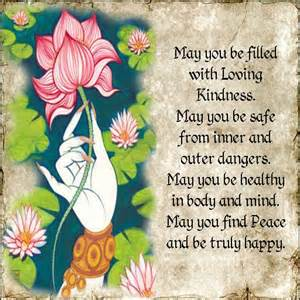
I did this post on metta, describing it as a meditation subject. It's when you can get past any anger, hatred, resentments, jealousies and such and start to feel the love flowing within, going deeper within and letting it radiate outwordly like in this poem:
Instument of Peace
Where there is hatred, let me bring love
Where there is doubt, let me bring faith
Where there is falsehood, let me bring truth
Where there is pain, I'll comfort you
Where there is silence, let me sing praise
Where there's despair, let me bring hope
Where there is blindness, let me bring sight
Where there is darkness, let me bring light
And with these words I speak
Grant that I may not so seek
To be heard but to hear
To be consoled but to console,
Not to be seen, but to see
To be loved but to love
For when we give love we will receive
When we forgive love, we'll find reprieve
It is in dying we'll be released
Make me an instrument of peace
You are very fortunate to have good friends like that, that you can sit with. Sitting with a group seems to raise the energy. That is one of the reasons why I benefited so much from taking a course, where they had the group sittings, and the energy would rise. I had kinda forgot about how hard it was to sit for long periods of time at first. I do have to adjust my position and I still find it hard to do a Daytona sitting where you do not move. My problem while I was at the course was that I had sensed something had happened back home but I really hoped that no one would call, making it so I had to leave the courses (kind of the opposite of you and your dad.) When I got home I found out dad had broke his hip and was in the hospital. His partner never called me for she didn't figure I could really do anything and I would be home in a few days anyways. It was lovely the last day of the course when we could visit with every one and everyone was in such a good space.
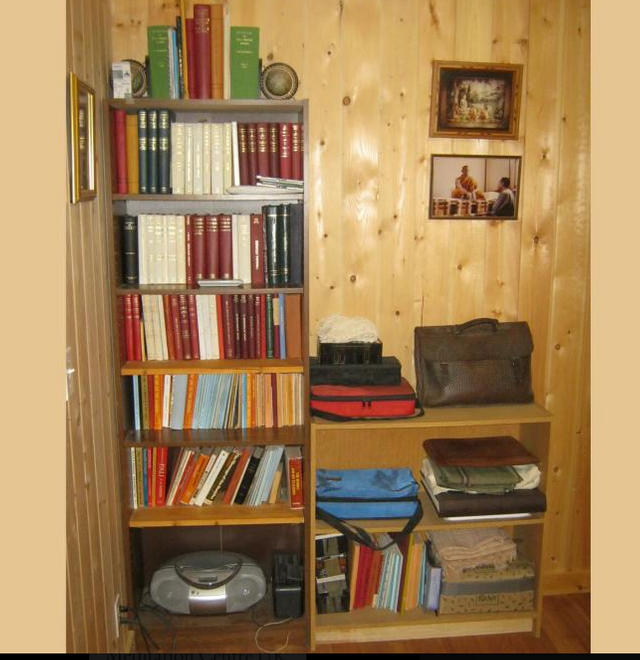
Porter's Dhamma Library
RF: I'm looking forward to sitting another course in December (ten days without Steemit - aaah!). Are you going to do another course soon?
Porters: I would love to go back to the center and sit a course there again but flying from Canada to the States is expensive and we kind of have our own little center here. I most always have my hour sitting in the morning then an hour in the evening, but I tend to skip that one when I'm feeling tired from a full day. I just want to go to bed. We were working towards doing three hours a day but changes came about in my life and just like you I found it to difficult to find the time. When I retire from my job working with the Pre-K kids in a few years I can more easily fit in that extra hour and I know it will really change my life which will be a good thing!
RF: Oh yes, I agree! People do say that meditation actually give you more space in your head - Goenkaji's discourse says something of the sort, doesn't it? My yoga teacher years ago used to say the same thing, but I didn't quite believe her.
But watching this clip from Yuval Hurari, who wrote Sapiens, he talks about how he couldn't have written his books without the help of the focus and disclipline and clarity of this kind of meditation. So it can give us more space to create and to do things.
Harari talks about us practicing to see reality as it is, right here and right now - not to get in touch with any story. It's just about really observing what it is right now, without trying to change it. That if we can't observe the reality of our breath for more than 10 seconds, how can we observe the reality of the world, like political systems! So true.
I think he sums it up really well - that Vipassana isn't about having 'special experiences' but to get to know the most ordinary, daily, natural functions of our body - anger, pain, boredom and so forth so we can deal with those things as they come up. That a good life is experiencing reality as it is. This is what I've loved about a meditative practice because it enables me not to get wrapped up in my thoughts and problems so much that they make me suffer.
I love the way he continues by talking about how nations are just stories we create,temples are stories, everything is just a story. But it's the people who suffer through unpleasant sensations when something happens to the nation or the temple. So surely if we could get less wrapped up in those emotions, those investments in the things we think are important, like broken temples, we wouldn't suffer as much and we'd probably suffer a lot less!
I thought I'd include SN Goenka's discourse on the habit patterns of the mind for the NM audience as he explains the habit patterns of the mind really well.
So the art of living is living in the present moment - not living in the past, not the worry of the future - the breath is going in, the breath is going out, the breath is going in, the breath is going out. It's so simple in theory huh!
Listening to the video makes me laugh - whenever I say to Dad I 'want' something like a new camera he says 'wanting, wanting, wanting' imitating Goenke, and it reminds us of the whole illusion of craving and aversion. Doesn't quite stop me wanting a camera, though, haha. But that's it, isn't it - we can only do our best to really live, and vipassana meditation helps us do this better, more kindly, compassionately - and gives us space to be better, more compassionate people. I think it should be compulsory for everyone, like a national service!
Porters: Thanks for sharing that video by Yuvai. He explains the meditation so well. It's funny when I sit to meditate it takes awhile for me to still my mind and become more aware of the changing nature of our being, watching my mind and seeing how I really spend my time, often off on some trip, then I draw my mind back in, also once my mind is still it is often when my ideas for post or other writings that I do flow in with such clarity, sometimes so strong that I find it very hard to continue with my meditation and will leave it to get my ideas down. That truly is one of the benefits of Vipassanna meditation that it helps you see things as they really are, right here right now. That is what I am working on, is being more accepting of where I am at and working from that point.
I hear you about being aware that our cravings and aversions are illusionary but it's still not enough to stop us from wanting but I have found through my years of practicing the meditation I can see clearly that I am craving or avoiding but I don't always choose to end it, which is better than simply being totally reactionary.
One of the questions I often ask is "what is it that we really want our children to learn?". Vipassana meditation is definitely something for all of us to learn and how wonderful it would be if we were to have it as part of our upbringing, the earlier we are introduced to it the better.
RF: I know one of the most powerful moments on that course was experiencing on a cellular level the principle of annica. Could you explain to the readers here what this is?
For the first part of the course I worked on developing mindfulness through the concentration on the inflow and outflow of the breath. For the second part of the course I worked on the experiential aspect of Annicca by focusing on the sensations of the body. I would use this attentiveness of the sensations to experience and understand the nature of change (annicca.) I was able to see it as an ever changing process right within myself. While watching these subtle changes I was aware that the body was composed of very small sub atomic particles, each one dying simultaneously as it was becoming (some of my science lessons coming out!) When you keep focused on these changes, taking it a little deeper, the realization comes that the body is not the entity that it appears to be, but it is a continuum of changing matter with the life-force existing within. Take this new perspective and see what a different view it gives to the ego!
RF: That 'particle' level change absolutely blew my mind!
Porters: Indeed. Yes, that "particle" level change gave me a whole new perspective! With understanding this changing nature and being able to see how our attachments to things that were impermanent it let me see how this could cause a lot of suffering. Being more mindful, I tend to not get as attached to so many things and realizing that we are composed of ever changing matter with a life-force with in it, I haven't cultivated much of an ego which saves me a lot of grief too! These lessons of the changing nature and impermanence of all conditioned things has served me well through out the years. Knowing that all things pass, when times are a bit tough I knew they too would pass. Even one time, in the night, when I had fallen and hit the back of my head on the tub, I could go to that quiet spot within me, knowing that the inability to move and the dizziness would pass or that I might pass, I could remain calm and sure enough, by morning it had started to subside and I could arise and carry on with my day.
RF: Oh, annica. Of all lessons this was the most profound for me and actually sensing it on a cellular level blew my mind. I'm trying to remind Dad of that today as he is a bit down in hospital! Rising and falling away, rising and falling away. There's very clear reminders in nature all the time isn't there... waves seasons, night and day - yet we seem to put ourselves outside those laws! Daily practice helps this understanding become our first go to, our instinct - rather than react in a way that doesn't help us we can go back to the breath and anicca, annica, annica. The lesson in Buddhism about impermanence really has to be experienced to be fully understood, doesn't it?
Porters: Yes, and we're lucky to have experienced it. It's funny you talk about your Dad and the usefulness of vipassana understanding as you struggle with death. Many of the discussions I've had with my husband have been on the suffering of illness, old age (especially as we are getting into the senior years -72 years old and 62 years old, and death. Being more mindful and aware of the changing nature of things helps us not to become so attached to them, it really is a freeing experience! We discuss how the meditation teaches us how to live well, so we can die well and using it for preparing. Nature shows us that too, with the life cycles. Watching the plants, especially here where our growing seasons are so short, the intensity the plant puts into fulfilling it's purpose, to reproduce, before it begins to deteriorate and fade away.
RF: Agreed, I talk about this often in my posts! It's all around us, and you don't need a book to understand it once you have the idea of impermanence.
Porters: That was the beauty of the Vipassana course is that it gave you a way to experience annicca and you did not have to have the years of studying the texts but you could delve right in, building your understanding. Sayagyi U Ba Khin (the original teacher in the tradition I had been following) said of the Buddha-Dhamma meditation practise "If you know impermanence (Annicca) truly, you know Dukka (suffering ) also as a sequel, and to lack ego (Annatta) as ultimate truth. But it takes time to understand the three together" These three characteristics of all conditioned things, Annicca, Dukka and Annatta, are what I am working on understanding and I'm starting to see how they all fit together. This understanding and many of the other teachings of the Buddha help me have a more peaceful and joyful life.
RF: You do seem to live a beautiful and peaceful life on the forest! Perhaps one day I'll have the good fortune of meditating with you there. Thanks so much for this beautiful conversation.
Have you sat a vipassana course? Do you meditate? Have you been thinking about doing one?


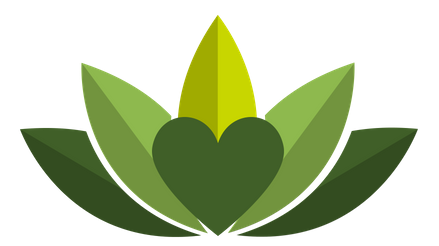
Vipassana is great, @porters is great and this was a great read. There is so much value here 💚
Hey @zen-art Thanks for the compliment! It was wonderful to do the interview with @riverflows she is such a wonderful writer and inspires me to write. Really glad we had the opportunity to get some info out on Vipassana.
I really enjoyed this interview you two! Thank you! what a great entry for anyone reading for the first time about Vipassana and also some further insight here.
@mountainjewel glad you like the interview! I sure enjoyed doing it with @riverflows (she's a wonderful writer, very inspiring!) being able to share our Vipassana experiences together and get that info out.
This sounds incredibly peaceful. We have not meditated before but I keep wanting to try it out. Someday we will be able to, alas with a small child there is hardly an opportunity to do so!
Hey @cmplxty the Vipassana meditation has really added to the peacefulness of my life. You might be surprised how children pick up on the peaceful vibes when you are meditating becoming more calm themselves. Although you must first attend to any of there needs. I do hope you get a chance to pick it up.
i really do want to try this again as I left early from one once. I am just now getting over the 'trauma' of doing that, as I had panic attacks for a week after I left. would have been better to stick it through.
Hey @ofsedgeandsalt Sorry to hear you were having panic attacks after taking the course. I wonder if you go with a friend if that would help alleviate the panic attacks for you could share your experience with your friend. It always seems in those courses as you a getting deeper into it more comes up and if you can persevere you will benefit more. Hope you get to sit another course and I'd love to hear about it.
well when I did it i did go with my partner at the time... but he was on the other side, and obviously you can't talk to anyone or even look at anyone while you're in there, and it made it even harder i think because i felt like i couldn't ask for help. it was hard for me to feel like I couldn't ask for help from the teachers either, i think i didn't understand the rules, and that you could ask one of the assistants any time for help if needed. i have had issues around sleep in my life in the past, and it came up during the course, where I couldn't sleep at all, like all night long (this happened when I took birth control for 6 months once) and that thought loop pattern that happens with my and insomnia was in overdrive and i felt like I was losing my mind... i mean that's what happens anyway in there right? i know I should have stayed and dealt with it... maybe I'd be able to handle the sleep issues I have now better if i had just pushed through.
I was thinking of you talking to a friend once the course was over but you definitely could have talked to the assistant during the course. Did you not have a checking session where you could talk to the teacher during the course? Now that you have a better understanding you would probably be able to benefit more from sitting a course. I find meditating helps me sleep better. Did you pick up enough of the meditation in the time you were there that you could try a bit at home - kinda ease into it.
i did understand the once a day period to check in with the teacher... but in the middle of the night when I was wandering around outside unable to sleep and extremely distraught and panic attacking... i wasn't sure if i should talk to someone.. or just keep wandering around distraught.. i got through the concentration part of the course but just started the body scan part when I left early. i will try it again one day... i think the trauma of leaving early and being panic attacked and insomniatic for the next two weeks after is finally settling out.. i thought later, well, it would have been better to be going through that in there than 'out' in the world. I didn't have a home at the time so it's not like i had a safe place to go after to recoup...
Ah, I see! It does make it more difficult if you did not have a home to recoup in and I understand you not wanting to disturb anyone in the middle of the night. I'm glad the trauma part is passing and I do hope you get a chance to sit another course when you are really feeling ready.
cooooooool !!!
This post was shared in the Curation Collective Discord community for curators, and upvoted and resteemed by the @c-squared community account after manual review.